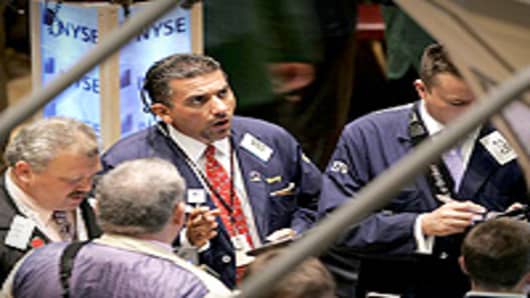Friday is Quadruple Witching Day. But with geopolitical events rocking stocks this week, this quarterly event has had less effect on the markets than usual.
Quadruple witching is when contracts for stock index futures, stock index options, stock equity options and single stock futures expire. This happens once every quarter, on the third Friday of March, June, September and December.
Before single stock futures were added to the mix in 2002, the day was known as “triple witching,” owing its name to the three witches of Shakespeare's “Macbeth.”
The name also describes the wild volume and volatility that historically takes place in derivatives markets as well as the broader market as investors on both sides of each trade buy and sell securities. For that reason, it's also known as "Freaky Friday."
Over the last couple years, however, trades have been unwound earlier in the week, leading to fewer wild swings on quadruple witching day itself, said Nate Peterson, senior derivatives analyst at Charles Schwab.
Typically all this activity, however, does lead to an uptick in the overall market, Peterson said.
“More often than not, the market will have a positive week on those quadruple witching weeks,” he said.
But this week was different, as events unfolding with the nuclear crisis in Japan, as well as a constantly changing scene in the Middle Eastand Libya, kept investors scrambling through wild swings. On Wednesday, all the major indices hit lows for the year. On Thursday, they regained about half their losses.
Options volume on Wednesday, March 16 soared to 28 milllion shares, said Randy Frederick, director of trading and derivatives at Schwab. Normally, 17-18 million shares change hands in a day; during periods of options expirations, that volume can rise to 23-24 million, Frederick said.
Volumes this past Wednesday were likely particularly high because of the combination of quadrapule witching and a highly volatile session that sent the S&P 500 down nearly 2 percent, he added.
Derivative contracts such as options and futures are used mostly by institutional investors to hedge positions or to speculate. Generally, options give the holder the right to buy or sell an asset underlying a contract when the option expires. But holders of futures contracts are obligated to buy or sell the underlying asset on the expiration date.
Many institutional investors use options and futures to bet on the relative strength of individual stocks versus the relative strength of the index overall, and in the process, they may use several types of derivative contracts, says J.J. Kinahan. “You are constantly hedging one with the other,” he said.
For example, investors will typically buy stock index options—representing the top 20-weighted stocks in theS&P 500—and hedge the position by selling futures against the S&P 500, he said.
As quadruple witching approaches, and these contracts get set to close, investors begin to sell off their positions. The trading gets spread out during the days before as investors sell positions in "bits and pieces" in an attempt to take advantage of moves in the markets, Kinahan said.
“Because stocks move in relation to index futures, and in relation to each other, you are getting out of the part of the position that is most profitable at the moment,” Kinahan said.
Track Stock Funds, Bond Funds, Money Market Funds and ETFs Here


